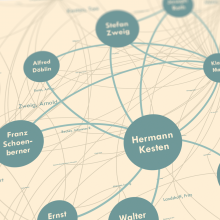Modernity as Loss?
Text Structures, Variants and Cycles of Literary Cultural Critique

Project Management: PD Dr. Benjamin Gittel (Universität Trier - Trier Center for Digital Humanities (TCDH))
Sponsors: Deutsche Forschungsgemeinschaft (Heisenberg-Programm)
Running time: since
Contact person (TCDH): PD Dr. Benjamin Gittel
References:
Benjamin Gittel: »Der Roman zeigt, dass …«: Implizite literarische Assertionen, Weltanschauungen und ideologiekritische Interpretationen. In: Scientia Poetica 27.1 (2023), S. 147-176. https://doi.org/10.1515/scipo-2023-006
Benjamin Gittel: Möglichkeiten und Limitationen fiktional-literarischer Kulturkritik in Hermann Brochs Schlafwandler-Trilogie, Joseph Roths „Radetzkymarsch“ und Ernst Wiecherts „Das einfache Leben“. In: Eckart Conze, Jan de Vries, Jochen Strobel u. Daniel Thiel (Hg.): Aristokratismus. Historische und literarische Semantik von „Adel“ zwischen Kulturkritik der Jahrhundertwende und Nationalsozialismus. Münster 2020, S. 121–138. academia.edu
Research Area: Digital Literary and Cultural Studies
Keywords: cultural critique, genre theory, literary change, text structures
One of the most enduring narratives in European history since Rousseau is the narrative of a general decline or collective loss in a changing world. Thus, 76% of Europeans believe that “[t]he world used to be a much better place" (eupinions 2022). The project examines how the "normatively charged mode of reflection" (Georg Bollenbeck) of cultural critique underlying such attitudes manifests itself in literature. The overarching aim is to describe this hitherto elusive phenomenon in terms of literary theory and narratology and to analyze its variants and diachronic development on a broad empirical basis using computational methods.
Anyone dealing with the complex of cultural critique (germ. “Kulturkritik”) and critique of modernity in literary texts quickly encounters a whole field of terms that are used as a matter of course in literary criticism: "decadence", "critique of progress", "contemporary critique", "social critique", “regional heritage art” ("Heimatkunst"), "cultural critique", "cultural pessimism", "literature of the conservative revolution", "critique of modernity", “worldview literature” ("Weltanschaungsliteratur"), “critique of contemporary affairs” ("Zeitkritik"), “critique of civilization”, etc. However, most of these terms, which presumably only have in common that the texts falling under them articulate certain experiences of loss, have so far not been clearly defined in research and oscillate in an unexplained way between genre and thematic terms.
This is where the project comes in by combining findings from literary studies, computational modeling and quantitative and qualitative text analysis in order to: (i) identify attributions of such terms to literary works, (ii) determine similarities and differences between the resulting corpora, (iii) identify textual correlates of these terms that are significant in literary studies (such as references, evaluations and semantic codings), (iv) develop computational models to automatically identify such features and their interrelations, and finally (v) model their change in literary history.
Publications
- Benjamin Gittel. „Narratives of Decline: On Contemporary European High-brow Fiction’s Engagement with Cultural Critique”. In Humanities and Social Sciences Communications 12, 530 (2025) [=Critical Modernity Studies: Interdisciplinary Approaches to Social Pathologies]. https://doi.org/10.1057/s41599-025-04865-1
- Benjamin Gittel. „„Gesellschaftskritik“, „Kulturkritik“, „Sozialkritik“, „Zeitkritik“ ... Zuschreibungen und textuelle Korrelate fiktional-literarischer Kritik.“ In Zeitschrift für Germanistik N.F. 35, 1 (2025), S. 135–156. https://doi.org/10.3726/92175_135
- Benjamin Gittel. „Die Architektur fiktionaler Kritik: Evaluative Textstrukturen, Codierungen und implizite Assertionen.“ In Textpraxis 2 (2023) (=Special Issue: Wer macht was in der Literaturtheorie? Eine Bestandsaufnahme aktueller literaturtheoretischer Forschung, herausgegeben von Stefan Descher, Eva-Maria Konrad und Thomas Petraschka). https://doi.org/10.17879/19958496159
- Benjamin Gittel und Gesa Bei der Wieden. „Exploring Fictional Critique and Literary Evaluations.” In The Book of Abstracts of DH2024. Washington. Poster: https://doi.org/10.5281/zenodo.13934974
- Benjamin Gittel: Evaluative Structures in Narrative Fiction (1.0.0) [Data set]. Zenodo. https://doi.org/10.5281/zenodo.16570556
- Benjamin Gittel: Modernity Critique Corpus in Derived Text Format (1.0). Zenodo. https://doi.org/10.5281/zenodo.14389921
Team TCDH
Fiona Scheurer
E-mail: s2fische uni-trier [dot] de
uni-trier [dot] de
Phone: +49 651 201-3365
Naima Islam Nodi
E-mail: s4nanodi uni-trier [dot] de
uni-trier [dot] de
Phone: +49 651 201-3365
PD Dr. Benjamin Gittel
E-mail: gittel uni-trier [dot] de
uni-trier [dot] de
Phone: +49 651 201-3003
Salmoon Ilyas
E-mail: s4muilya uni-trier [dot] de
uni-trier [dot] de
Phone: +49 651 201-3365



